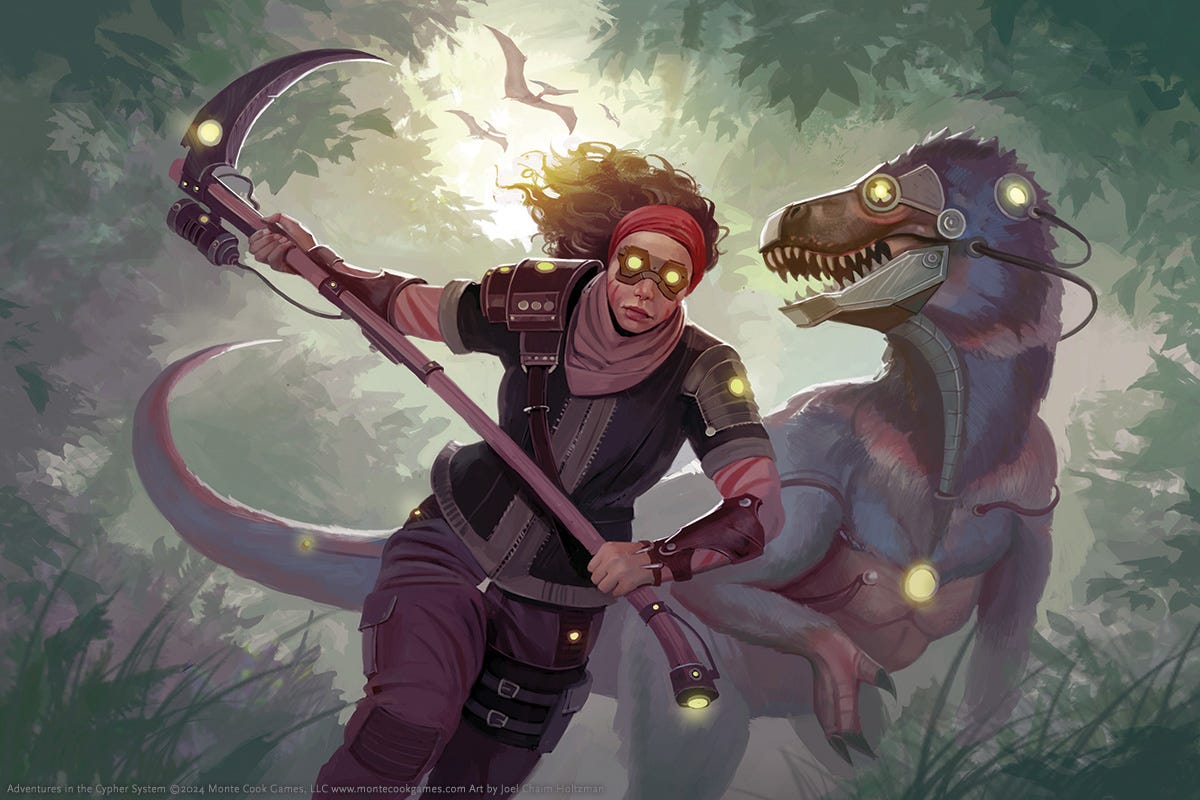Hanging on Tight
When modifying a rules set, most people focus on what’s changing, but just as— if not more—important is what remains the same. What this really comes down to is, what is the essence of the original rules that, if changed, stops it from being the same game?
Rightly or wrongly, this is why so many long-time D&D players embraced 3rd edition but not the 4th edition. Both editions arguably changed a lot of the rules, but many felt 4th edition veered too far from the essence of the game. (It’s why 5th edition reverted back to a more 2nd or 3rd edition style game, while quietly retaining some of the advancements of 4th.)
So it’s not really a matter of how much you change, but what you change. This caused us to look at Cypher and really think about what makes it the game so many enjoy. We came up with three very broad answers:
1. Customization of characters
2. Ease of running the game
3. As a “traditional RPG,” a rather heavy focus on narrative
Customization
The core of character creation in Cypher is the character sentence. I am a blank blank who blanks, or, I am a descriptor type who focuses. We not only wanted to retain that, we wanted to give more options and, in general, make building the sentence easier and faster so you can get playing the game more quickly.
I wrote last time about our ideas regarding character type. Descriptors have sometimes been a little muddied with extraneous stuff, and so we have worked to standardize and streamline them by simply making each a stat modification and a starting skill.
And foci, well … we love foci, so we just wanted to make them more fun. Rather than a proscribed progression, we asked, what if they worked more like skill trees found in some video games (or the forte in Invisible Sun)? This would mean each focus might have a different “path” you could follow through it as you advance, and you could take the abilities you really want. (As a side effect, adding more abilities to the foci makes advancing characters beyond Tier Six really easy!)
Lastly, there were a lot of abilities (from both focus and type) in the game that just eased a task one way or another. Useful, but not always interesting. With plenty of ways of easing tasks (the foremost being Effort, another core concept of the game), we think it’s more fun if most abilities grant a character a true, new capability. In particular, we wanted to expand the number of abilities useful outside of combat, especially interaction and exploration.
Ease of Running the Game
Cypher is a joy to run as a GM, full stop. There are many reasons for this, but likely more prominent is that NPCs and creatures are simplified compared to characters, with all the necessary information to run them sometimes being encoded into a single number: their level. I wouldn’t change that for anything.
This has the added benefit of keeping past adventures and sourcebooks valid, regardless of any changes we might make to the game. If creatures and NPCs don’t change, that means you can still pick up any past book and use it pretty much as written. (Character abilities from older products will also work just fine, but one might not always see the need for them, depending on the context.)
Likewise, cyphers and artifacts, GM intrusion ideas, traps, challenges, and similar things from older products will still be perfectly viable alongside what we’re doing.
Focus on Narrative
Narrative focus is something that couldn’t change if we wanted the game to remain intact. In this context, it might be useful to consider very broad definitions of traditional versus narrative games. So, consider that a “traditional” game focuses on rules that simulate reality (or fiction)—D&D being the obvious example—that then allow a story to emerge from the situations that those rules define. A “narrative” game worries far less about simulation and much more about the story—a couple of examples are Powered by the Apocalypse and Fate. I’m vastly oversimplifying here, but you might say that in a traditional game, your character takes damage after the bad guy shoots you because that’s what the rules say. In a narrative game, you might have to be rushed to the hospital after being shot because it makes for an exciting story.
For a traditional game, Cypher’s always leaned more heavily into story than strict dictation of the rules. While not a fully narrative or freeform game by any means, it actually strives to bridge narrative and trad gaming styles by also prioritizing what’s best for the story the group is creating. GM and player intrusions in the game are the easiest examples of this in Cypher.
We’ve found that focusing on story and smooth play means streamlining some of the rules clutter in the game. As so often happens with games, there are mechanics in the rules that seemed like a good, useful tool at the beginning that eventually no one really uses because they’re extraneous or don’t fit the overall style of the game. Frankly, these are rough edges to a game that a designer can smooth out and people won’t even notice that they’re gone, which is actually quite satisfying.
As we work, we hang on tight to what makes Cypher the game it’s always meant to be, and when we make a change, it’s to make things even more Cypher. We’re always fastidious about making sure it’s the game we all love.



